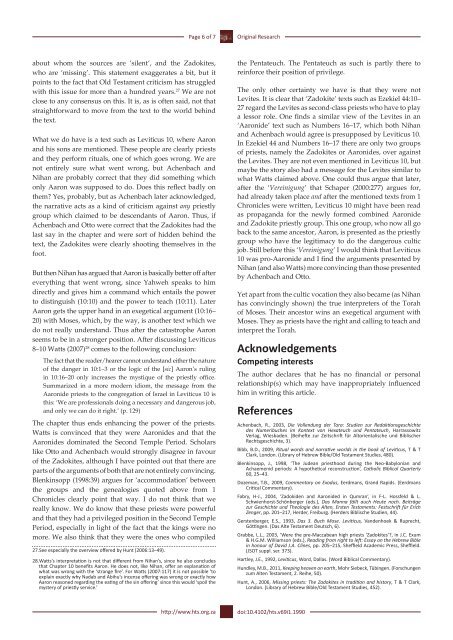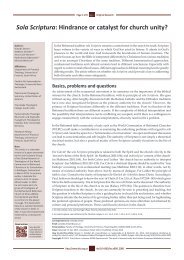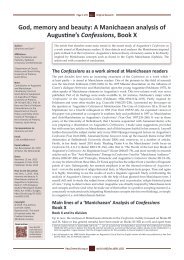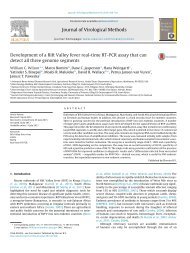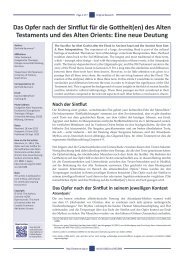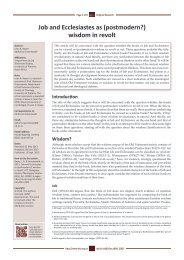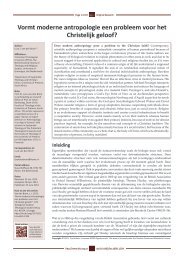Leviticus 10 and possible priestly power struggles - HTS Teologiese ...
Leviticus 10 and possible priestly power struggles - HTS Teologiese ...
Leviticus 10 and possible priestly power struggles - HTS Teologiese ...
You also want an ePaper? Increase the reach of your titles
YUMPU automatically turns print PDFs into web optimized ePapers that Google loves.
Page 6 of 7<br />
Original Research<br />
about whom the sources are ‘silent’, <strong>and</strong> the Zadokites,<br />
who are ‘missing’. This statement exaggerates a bit, but it<br />
points to the fact that Old Testament criticism has struggled<br />
with this issue for more than a hundred years. 27 We are not<br />
close to any consensus on this. It is, as is often said, not that<br />
straightforward to move from the text to the world behind<br />
the text.<br />
What we do have is a text such as <strong>Leviticus</strong> <strong>10</strong>, where Aaron<br />
<strong>and</strong> his sons are mentioned. These people are clearly priests<br />
<strong>and</strong> they perform rituals, one of which goes wrong. We are<br />
not entirely sure what went wrong, but Achenbach <strong>and</strong><br />
Nihan are probably correct that they did something which<br />
only Aaron was supposed to do. Does this reflect badly on<br />
them? Yes, probably, but as Achenbach later acknowledged,<br />
the narrative acts as a kind of criticism against any <strong>priestly</strong><br />
group which claimed to be descendants of Aaron. Thus, if<br />
Achenbach <strong>and</strong> Otto were correct that the Zadokites had the<br />
last say in the chapter <strong>and</strong> were sort of hidden behind the<br />
text, the Zadokites were clearly shooting themselves in the<br />
foot.<br />
But then Nihan has argued that Aaron is basically better off after<br />
everything that went wrong, since Yahweh speaks to him<br />
directly <strong>and</strong> gives him a comm<strong>and</strong> which entails the <strong>power</strong><br />
to distinguish (<strong>10</strong>:<strong>10</strong>) <strong>and</strong> the <strong>power</strong> to teach (<strong>10</strong>:11). Later<br />
Aaron gets the upper h<strong>and</strong> in an exegetical argument (<strong>10</strong>:16–<br />
20) with Moses, which, by the way, is another text which we<br />
do not really underst<strong>and</strong>. Thus after the catastrophe Aaron<br />
seems to be in a stronger position. After discussing <strong>Leviticus</strong><br />
8–<strong>10</strong> Watts (2007) 28 comes to the following conclusion:<br />
The fact that the reader/hearer cannot underst<strong>and</strong> either the nature<br />
of the danger in <strong>10</strong>:1–3 or the logic of the [sic] Aaron’s ruling<br />
in <strong>10</strong>:16–20 only increases the mystique of the <strong>priestly</strong> office.<br />
Summarized in a more modern idiom, the message from the<br />
Aaronide priests to the congregation of Israel in <strong>Leviticus</strong> <strong>10</strong> is<br />
this: ‘We are professionals doing a necessary <strong>and</strong> dangerous job,<br />
<strong>and</strong> only we can do it right.’ (p. 129)<br />
The chapter thus ends enhancing the <strong>power</strong> of the priests.<br />
Watts is convinced that they were Aaronides <strong>and</strong> that the<br />
Aaronides dominated the Second Temple Period. Scholars<br />
like Otto <strong>and</strong> Achenbach would strongly disagree in favour<br />
of the Zadokites, although I have pointed out that there are<br />
parts of the arguments of both that are not entirely convincing.<br />
Blenkinsopp (1998:39) argues for ‘accommodation’ between<br />
the groups <strong>and</strong> the genealogies quoted above from 1<br />
Chronicles clearly point that way. I do not think that we<br />
really know. We do know that these priests were <strong>power</strong>ful<br />
<strong>and</strong> that they had a privileged position in the Second Temple<br />
Period, especially in light of the fact that the kings were no<br />
more. We also think that they were the ones who compiled<br />
27.See especially the overview offered by Hunt (2006:13–49).<br />
28.Watts’s interpretation is not that different from Nihan’s, since he also concludes<br />
that Chapter <strong>10</strong> benefits Aaron. He does not, like Nihan, offer an explanation of<br />
what was wrong with the ‘strange fire’. For Watts (2007:117) it is not <strong>possible</strong> ‘to<br />
explain exactly why Nadab <strong>and</strong> Abihu’s incense offering was wrong or exactly how<br />
Aaron reasoned regarding the eating of the sin offering’ since this would ‘spoil the<br />
mystery of <strong>priestly</strong> service.’<br />
the Pentateuch. The Pentateuch as such is partly there to<br />
reinforce their position of privilege.<br />
The only other certainty we have is that they were not<br />
Levites. It is clear that ‘Zadokite’ texts such as Ezekiel 44:<strong>10</strong>–<br />
27 regard the Levites as second-class priests who have to play<br />
a lessor role. One finds a similar view of the Levites in an<br />
‘Aaronide’ text such as Numbers 16–17, which both Nihan<br />
<strong>and</strong> Achenbach would agree is presupposed by <strong>Leviticus</strong> <strong>10</strong>.<br />
In Ezekiel 44 <strong>and</strong> Numbers 16–17 there are only two groups<br />
of priests, namely the Zadokites or Aaronides, over against<br />
the Levites. They are not even mentioned in <strong>Leviticus</strong> <strong>10</strong>, but<br />
maybe the story also had a message for the Levites similar to<br />
what Watts claimed above. One could thus argue that later,<br />
after the ‘Vereinigung’ that Schaper (2000:277) argues for,<br />
had already taken place <strong>and</strong> after the mentioned texts from 1<br />
Chronicles were written, <strong>Leviticus</strong> <strong>10</strong> might have been read<br />
as propag<strong>and</strong>a for the newly formed combined Aaronide<br />
<strong>and</strong> Zadokite <strong>priestly</strong> group. This one group, who now all go<br />
back to the same ancestor, Aaron, is presented as the <strong>priestly</strong><br />
group who have the legitimacy to do the dangerous cultic<br />
job. Still before this ‘Vereinigung’ I would think that <strong>Leviticus</strong><br />
<strong>10</strong> was pro-Aaronide <strong>and</strong> I find the arguments presented by<br />
Nihan (<strong>and</strong> also Watts) more convincing than those presented<br />
by Achenbach <strong>and</strong> Otto.<br />
Yet apart from the cultic vocation they also became (as Nihan<br />
has convincingly shown) the true interpreters of the Torah<br />
of Moses. Their ancestor wins an exegetical argument with<br />
Moses. They as priests have the right <strong>and</strong> calling to teach <strong>and</strong><br />
interpret the Torah.<br />
Acknowledgements<br />
Competing interests<br />
The author declares that he has no financial or personal<br />
relationship(s) which may have inappropriately influenced<br />
him in writing this article.<br />
References<br />
Achenbach, R., 2003, Die Vollendung der Tora: Studien zur Redaktionsgeschichte<br />
des Numeribuches im Kontext von Hexateuch und Pentateuch, Harrassowitz<br />
Verlag, Wiesbaden. (Beihefte zur Zeitschrift für Altorientalische und Biblischer<br />
Rechtsgeschichte, 3).<br />
Bibb, B.D., 2009, Ritual words <strong>and</strong> narrative worlds in the book of <strong>Leviticus</strong>, T & T<br />
Clark, London. (Library of Hebrew Bible/Old Testament Studies, 480).<br />
Blenkinsopp, J., 1998, ‘The Judean priesthood during the Neo-Babylonian <strong>and</strong><br />
Achaemenid periods: A hypothetical reconstruction’, Catholic Biblical Quarterly<br />
60, 25–43.<br />
Dozeman, T.B., 2009, Commentary on Exodus, Eerdmans, Gr<strong>and</strong> Rapids. (Eerdmans<br />
Critical Commentary).<br />
Fabry, H-J., 2004, ‘Zadokiden <strong>and</strong> Aaronided in Qumran’, in F-L. Hossfeld & L.<br />
Schwienhorst-Schönberger (eds.), Das Manna fällt auch Heute noch. Beiträge<br />
zur Geschichte und Theologie des Alten, Ersten Testaments: Festschrift für Erich<br />
Zenger, pp. 201–217, Herder, Freiburg. (Herders Biblische Studien, 44).<br />
Gerstenberger, E.S., 1993, Das 3. Buch Mose. <strong>Leviticus</strong>, V<strong>and</strong>enhoek & Ruprecht,<br />
Göttingen. (Das Alte Testament Deutsch, 6).<br />
Grabbe, L.L., 2003, ‘Were the pre-Maccabean high priests ‘Zadokites’?, in J.C. Exum<br />
& H.G.M. Williamson (eds.), Reading from right to left: Essay on the Hebrew Bible<br />
in honour of David J.A. Clines, pp. 205–215, Sheffield Academic Press, Sheffield.<br />
(JSOT suppl. ser. 373).<br />
Hartley, J.E., 1992, <strong>Leviticus</strong>, Word, Dallas. (Word Biblical Commentary).<br />
Hundley, M.B., 2011, Keeping heaven on earth, Mohr Siebeck, Tübingen. (Forschungen<br />
zum Alten Testament, 2. Reihe, 50).<br />
Hunt, A., 2006, Missing priests: The Zadokites in tradition <strong>and</strong> history, T & T Clark,<br />
London. (Library of Hebrew Bible/Old Testament Studies, 452).<br />
http://www.hts.org.za<br />
doi:<strong>10</strong>.4<strong>10</strong>2/hts.v69i1.1990


